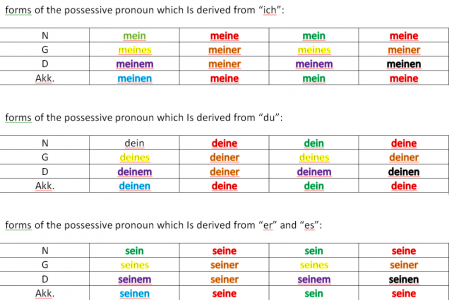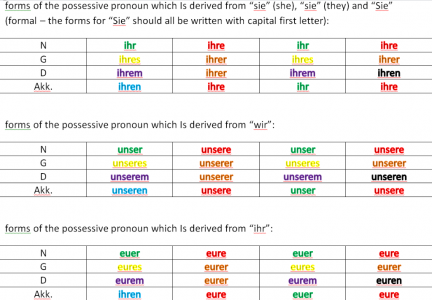I have decided to collect all these forms in one place because they are inseparably connected. Keep reading to find out how they’re connected.
If you take ONE LOOK at ALL forms, you will be able to see that one and the same endings repeat themselves consistently throughout the table/s.
For example, the accusative form of the masculine articles always gets the -(e)n ending; the dative form of the masculine and neuter articles always gets the -(e)m ending; the dative form of the feminine articles always get the -(e)r ending and so on. That is why I used colors on the tables.
Here is another way to explain what’s “happening” in the table/s below and help you memorize it better:
In German, we first learn the accusative forms. Why? Because accusative is the simplest case of them all! Accusative forms of articles look exactly the same as the nominative (feminine: die-die, neuter: das-das, plural: die-die)! There is just one exception: only masculine forms get an extra ending -(e)n in accusative.
On the other hand, in dative, we have the following endings: masculine: -(e)m, feminine: -(e)r, neuter: -(e)m, plural: -(e)n. You can imagine this sequence as M R M N. Do these letters remind you of something? Can you associate them with a word that makes some sense and that you could memorize easily? It reminds me of the word MoRMoN. You can “use” this association for yourself or you can find another one of your choice and preference.
Can you see now that learning German (or any other foreign language) can be fun! Yes, I know. 🙂 We just need to use associations, pictures, and storytelling and our brain will thank us for that. 🙂
This should help you to memorize these forms better. However, if it does not work, please feel free to bookmark this page and use it whenever you feel insecure about some of these forms.
Now that you’ve memorized all the forms from the tables, you could exercise a bit. Here we go:
Exercises for personal pronouns:
Exercises for possessive pronouns:








